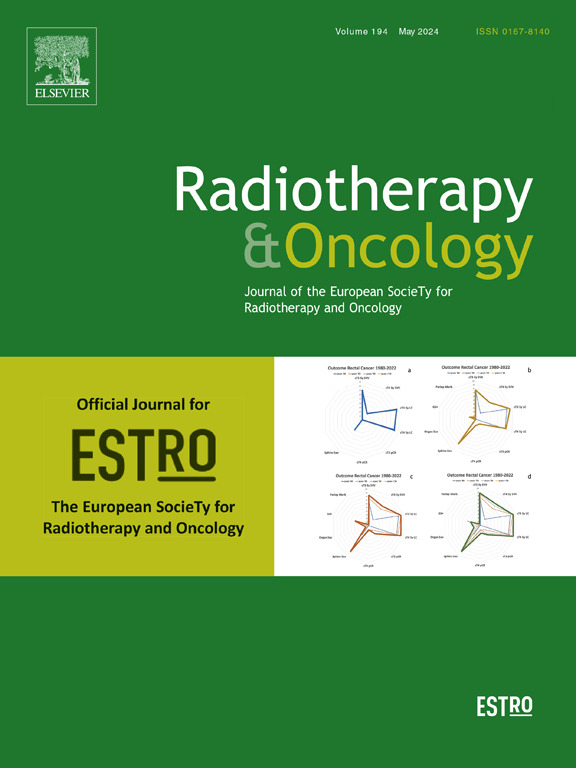放射肿瘤学患者对人工智能和机器学习在癌症治疗中的看法:一项多中心横断面研究
IF 4.9
1区 医学
Q1 ONCOLOGY
引用次数: 0
摘要
目的人工智能(AI)和机器学习(ML)在放射肿瘤学中的应用越来越广泛。然而,到目前为止,患者的参与度一直很低。在保健环境中尊重个人和知情同意原则要求承认病人的观点。本研究的目的是提供患者对在放射治疗的特定背景下使用AI/ML的看法的基线理解,以促进该技术的未来治理。方法编制AI/ML在放疗中的应用调查问卷。2024年6月至10月,澳大利亚两家公立医院对放射肿瘤学患者进行了调查。问题采用李克特五分制,分为六个主题。一个免费的文本项目允许参与者进一步评论。结果共收集问卷474份(474/811,完成率58%)。大多数参与者支持使用AI/ML来帮助医生完成放射肿瘤学特定任务(中位数评分(MS) 4.3),并对AI/ML的一般益处(MS 4.0)持积极看法。患者也强烈表示希望了解和知情(MS 2.2)。人工智能/机器学习的使用是否能够保持人性化和护理的公平性仍然存在很大的不确定性(MS 3.1)。结论:这是迄今为止最大规模的放射肿瘤学患者对AI/ML认知的问卷研究,建立了明确的基线。这些结果可以为放射治疗中AI/ML的未来治理提供信息。可操作的步骤包括告知患者在其护理中使用AI/ML,并在技术开发和监管期间让医生参与。本文章由计算机程序翻译,如有差异,请以英文原文为准。
Radiation oncology patients’ perceptions of artificial intelligence and machine learning in cancer care: A multi-centre cross-sectional study
Aim
The use of artificial intelligence (AI) and machine learning (ML) is increasingly widespread in radiation oncology. However, patient engagement to date has been poor. Respect for persons in the healthcare setting and the principle of informed consent requires recognition of patient perspectives. The aim of this study was to provide a baseline understanding of patient views about the use of AI/ML in the specific context of radiotherapy to contribute towards future governance of the technology.
Methods
We developed a new questionnaire regarding AI/ML use in radiotherapy. Radiation oncology patients were surveyed from June to October 2024 at two public hospitals in Australia. Questions were on a five-point Likert scale and grouped into six topics. A free text item allowed participants to comment further.
Results
We analysed 474 completed questionnaires (474/811, 58 % completion rate). Most participants supported using AI/ML to help physicians with radiation oncology specific tasks (Median Score (MS) 4.3) and held positive views on the general benefits of AI/ML (MS 4.0). Patients also strongly expressed a preference to be aware and informed (MS 2.2). Significant uncertainty remained about whether AI/ML use would enable retention of the human touch and equity in care (MS 3.1).
Conclusion
This is the largest questionnaire study to date of radiation oncology patients’ perceptions of AI/ML, establishing a clear baseline. These results can inform future governance around AI/ML in radiotherapy. Actionable steps include informing patients of AI/ML use in their care and engaging physicians during development and regulation of the technology.
求助全文
通过发布文献求助,成功后即可免费获取论文全文。
去求助
来源期刊

Radiotherapy and Oncology
医学-核医学
CiteScore
10.30
自引率
10.50%
发文量
2445
审稿时长
45 days
期刊介绍:
Radiotherapy and Oncology publishes papers describing original research as well as review articles. It covers areas of interest relating to radiation oncology. This includes: clinical radiotherapy, combined modality treatment, translational studies, epidemiological outcomes, imaging, dosimetry, and radiation therapy planning, experimental work in radiobiology, chemobiology, hyperthermia and tumour biology, as well as data science in radiation oncology and physics aspects relevant to oncology.Papers on more general aspects of interest to the radiation oncologist including chemotherapy, surgery and immunology are also published.
 求助内容:
求助内容: 应助结果提醒方式:
应助结果提醒方式:


